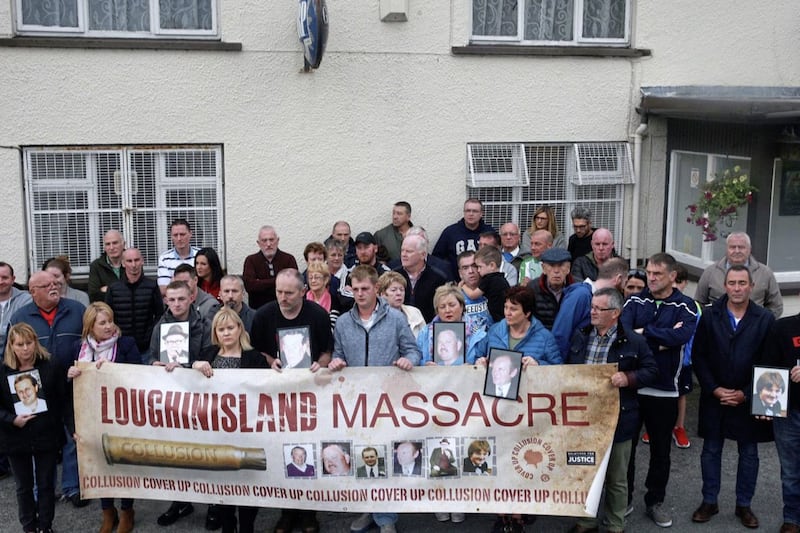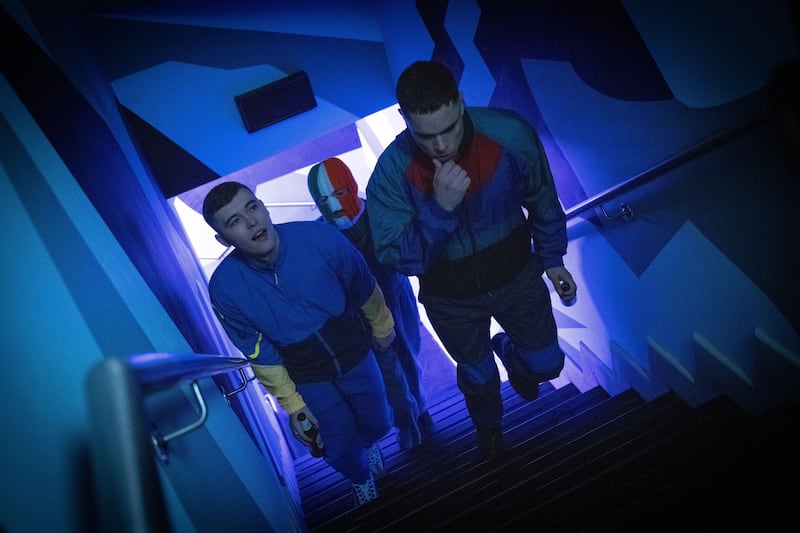TREVOR Birney has come a long way since getting his start in journalism at The Impartial Reporter in Enniskillen as a 17-year-old fresh out of school.
Today, the Co Fermanagh native is an Emmy-nominated factual film-maker whose debut scripted feature, the acclaimed Kneecap movie starring the titular Belfast Irish language hip-hop trio (and a certain Michael Fassbender), has become an international success that’s now generating Oscar buzz.
Birney’s Belfast-based production company Fine Point Films has built its reputation with hard-hitting documentaries tackling subjects including sexual abuse cover-ups within the Catholic Church (2012′s Mea Maxima Culpa), the Israel-Palestine conflict (2019′s Gaza), the republican hunger strikes (2016′s Bobby Sands: 66 Days) and collusion between loyalist killers and security forces during the Troubles (2017′s No Stone Unturned).
The latter Alex Gibney-directed film centred on the 1994 Loughinisland massacre in which six people were shot to death at the Heights Bar in south Down by loyalists on the evening of June 18 as they watched Ireland take on Italy in the World Cup.
It identified the perpetrators as three high-profile UVF men who were also protected RUC Special Branch informers, explaining how the gunmen used weapons from an illegal arms shipment which the security forces allowed to reach loyalist groups and that vital evidence was ‘lost’ or destroyed by the police in order to shield these ‘assets’ from prosecution.


Having named the suspected killers with the help of redacted Police Ombudsman draft reports on the RUC’s mishandling of the investigation which were anonymously leaked to the documentary’s lead investigative journalist, Barry McCaffrey, in 2018, he and producer Birney became the first people ever to be arrested and charged in connection with Loughinisland.
Accused of breaching the Official Secrets Act and with the theft and handling of classified material, their homes and the Fine Point Films office were thoroughly searched as part of a PSNI investigation led by Durham Constabulary.
Read more:

However, the charges were eventually dropped in 2020, and the pair received an apology from the PSNI, which was ordered to pay them damages totalling £875,000 by the High Court in Belfast.
The whole sorry affair is detailed in Shooting Crows: Mass Murder, State Collusion and Press Freedom, Birney’s new book on the Loughinisland massacre and its aftermath.

“I think the police lost their moral compass,” offers Birney (57), whose father was a member of the RUC reserve.
“They were so dug-in on legacy issues, so influenced by former RUC Special Branch officers, that I think that somehow it influenced the decision-making at the top of the PSNI,” he continues.

“I still wrestle with what exactly was going on in police headquarters in the days after No Stone Unturned came out, and how they believed that the rightful course of action was the arrest of journalists.
“They said, ‘No, we’re not going to go after the killers. This [documentary] is a shocking, damning indictment of the failure to bring those responsible for Loughinisland to justice. But we’re going to go after the journalists for pieces of paper’.
Read extracts from Shooting Crows: Mass Murder, State Collusion and Press Freedom

I still wrestle with what exactly was going on in police headquarters in the days after No Stone Unturned came out, and how they believed that the rightful course of action was the arrest of journalists
— Trevor Birney
“I believe that they really were after Dr Michael Maguire, the Police Ombudsman. They wanted to bring down the Ombudsman’s [damning 2016] report into Loughinisland, and they wanted to bring down the office itself in order to ensure there were no more Michael Maguires or Loughinisland reports.”
Today, the Loughinisland killers remain at large, and the families of those murdered still do not have justice for their loved ones.
“One of the most humbling moments in all of this was when Barry and I discovered that the families had held a vigil for us outside [The Heights] when we were arrested,” says Birney.

“To think that these families had suffered so much and yet they were standing on a vigil for us. Nothing that myself and Barry went through comes close to what they have gone through every single day of the last 30 years.”
Currently, the east Belfast-based film-maker is awaiting a final report by the Investigatory Powers Tribunal in London regarding unlawful police surveillance of the No Stone Unturned film-makers prior to their arrest.
Nothing that myself and Barry went through comes close to what the Loughinisland families have gone through every single day of the last 30 years.”
— Trevor Birney

“Ultimately, we would hope for a judgment that will help protect journalists and their sources,” explains Birney, whose journalistic CV also includes stints with Downtown Radio and Ulster Television.
“We are hopeful there will be a landmark judgment that will give journalists some comfort if they do find themselves in the position myself and Barry were in, where they know they are not going to wake up to police coming through their front doors.”
Birney adds: “It’s an important part of any properly functioning society that journalists can do their work without fear of being arrested.”

On the subject of kicking down doors, the aforementioned Kneecap movie from Fine Point Films is the biggest Irish box office hit of the year, despite being an Irish language feature centred on a Belfast group whose core fanbase remains concentrated in its home city.
Having firmly believed in writer/director Rich Peppiatt’s vision for the band’s fictionalised biopic - which involved Móglaí Bap, Mo Chara and DJ Próvaí become unwitting saviours of the Irish language when their ribald bi-lingual rap tunes capture the imagination of Belfast’s youths - producer Birney has been thoroughly enjoying Kneecap’s success, which began with winning the Audience Award at the Sundance Film Festival in January.
Just don’t mention the Oscars.
“I don’t even want to get into that,” laughs Birney of the film, which also secured international distribution at the US festival, “I can’t allow myself to even consider that word, it’s just madness.”
“No matter what else happens with this film, I think we’ve achieved something. What we’ve proven is that, as the Americans at Sundance told us, ‘it transcends its specificity’.
🏆 The Audience Award: NEXT presented by @Adobe goes to KNEECAP, directed by Rich Peppiatt (@richpeppiatt). #Sundance pic.twitter.com/1lARXkdyFa
— Sundance Film Festival (@sundancefest) January 26, 2024
“What they mean by that is, it’s about west Belfast, but it means something to everyone - it’s touched a nerve.”
Birney’s satisfaction at the positive reaction to the film has been further amplified by the fact that certain important individuals now singing Kneecap’s praises were rather less keen on it when it was still in development.
“I read an article about the London Film Festival this week, and there was a panel of all these experts going, ‘Oh, it’s the ‘Kneecap effect’ - what we’re all looking for is a Kneecap’,” the veteran journalist tells me.

“I loved it, because in reality, not a single one of them backed Kneecap. I felt like saying to them, ‘You had this script, you had the opportunity to back this film - and you turned it down’.
“So I think that is the greatest satisfaction, because those Oxbridge elites that still occupy positions of influence in the BBC and Channel Four and the British broadcasters have told us time after time that our stories don’t matter.
“And yet, they’re all sitting at festivals today lauding this film as being an example of how local stories can transcend.”

As for his motivation to pen Shooting Crows, Birney explains: “I hope the book is an example to the world of what can happen to journalism in these very turbulent times [of] disinformation, misinformation, and the struggles that newspapers and journalists have.
“Many times we turn on the TV and see Donald Trump railing against the media and accusing journalists of being in the pockets of governments around the world.
“But Shooting Crows tells you what governments will do to journalists when they tell the truth.”
Shooting Crows is out now, published by Merrion Press
Fine Point Films: coming soon
Saipan: The next scripted feature from the Fine Point stable will be a co-production with Dublin-based Wild Atlantic Pictures titled Saipan, a football-themed tale based on the real life bust-up between Republic of Ireland captain Roy Keane and manager Mick McCarthy during training for the 2002 World Cup in Japan.

Directed by Good Vibrations team Lisa Barros D’Sa and Glenn Leyburn and set for release next year, it will star Cork actor Éanna Hardwicke as Keane and Steve Coogan as McCarthy.
“Part of my job as a producer was to contact Roy and Mick, and I got two very different reactions for both of them,” explains Birney of having to keep the subjects of Saipan in the loop about the film.
“Mick was on a golf course in Portugal [when I called him]. I said, ‘Listen, you don’t know me from Adam, and I’m sorry to disturb you, but Steve Coogan wants to talk to you’.

“And he was going, ‘Steve Coogan wants to talk to me?’. I’m like, ‘Yeah, he does. We’re starting this film in a couple of weeks’ time and he wants to speak to you’.
“Then he said, ‘So, if Steve Coogan’s playing me - who’s playing the boy from Cork?’.
“When he realised that Steve Coogan was playing him, I’d say Mick was excited. And they had a wonderful conversation, Mick gave Steve a lot of time.”
As for Keano...

“I’ve been trying to get Roy to do a documentary for a couple of years, without any luck. I’d met him in Cork, and we had a great fun day. We kept the conversation going, and we were texting each other, and I thought he might do the documentary - but then he didn’t.
“Then [Saipan] came along. He was actually at the Euros, and I had to text him: ‘Just to let you know, we’re making this film’.
“I don’t want to give away the confidentiality of his text, but Roy kind of went, ‘Oh, yeah? Nothing to do with me. All the best’.
“It was pure Roy Keane.”
Other upcoming projects
“We’ve got a new music documentary that’s just gone off to Sundance, we hope, called Mad About The Boy, which is about Culture Club and Boy George.
“It’s directed by Alison Ellwood who did our previous docs on The Go Go’s and Cindy Lauper.

“There’s also a documentary film by Terry George (The Shore, Hotel Rwanda) based on the true story of the 1994 ceasefire, and a cynical Christmas film called You’ll Never Believe Who’s Dead which is set to start filming in Sligo in early 2025.
“There are three or four scripts that we hope to shoot next year. And we’ve got Rich Peppiatt’s next film which he’s currently writing. That is just unbelievably exciting, we’re really looking forward to it.
“So I do think that the next few years are probably going to be very different to the last few years. I really hope that means I’m not going to get arrested again.”









